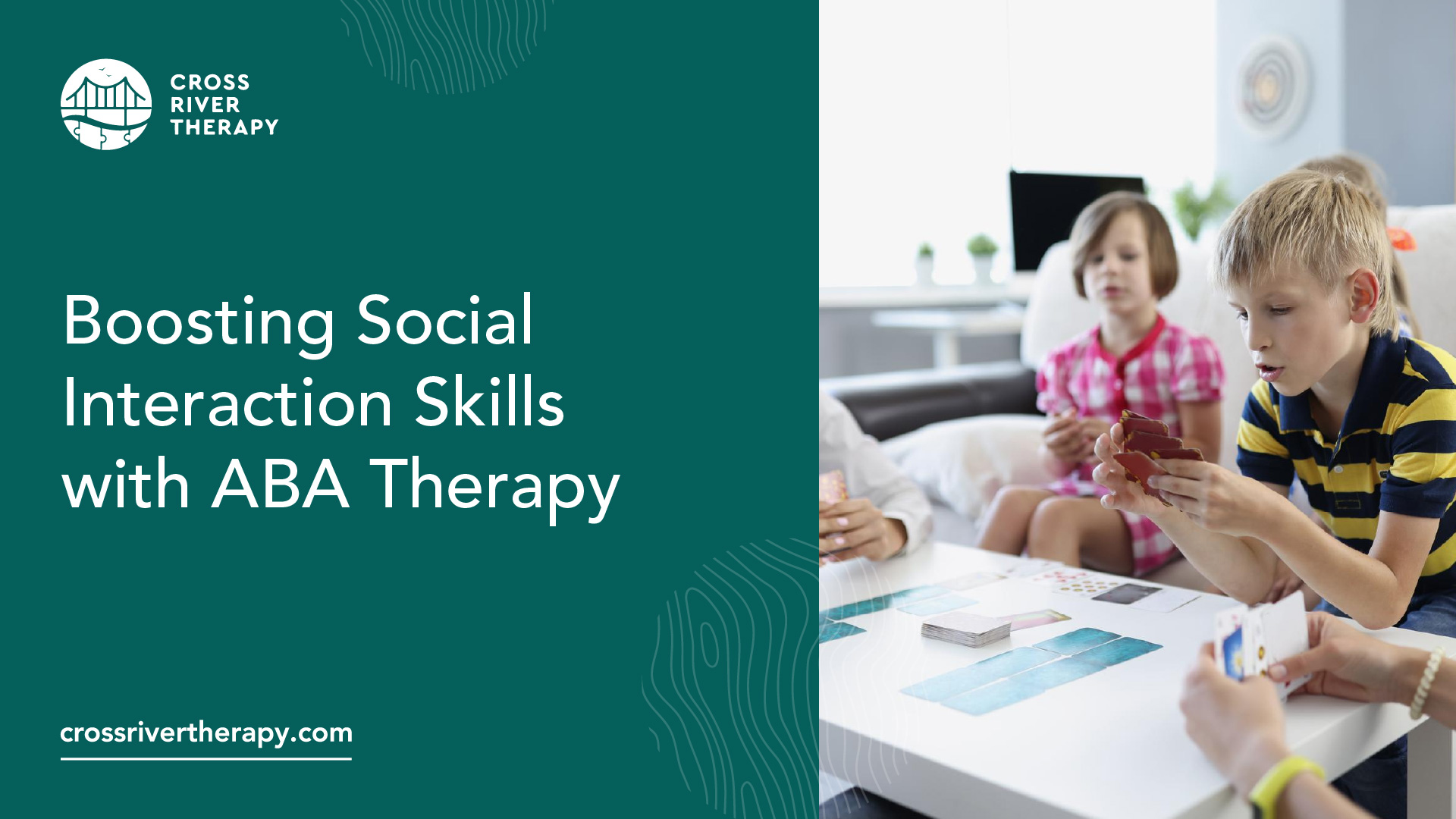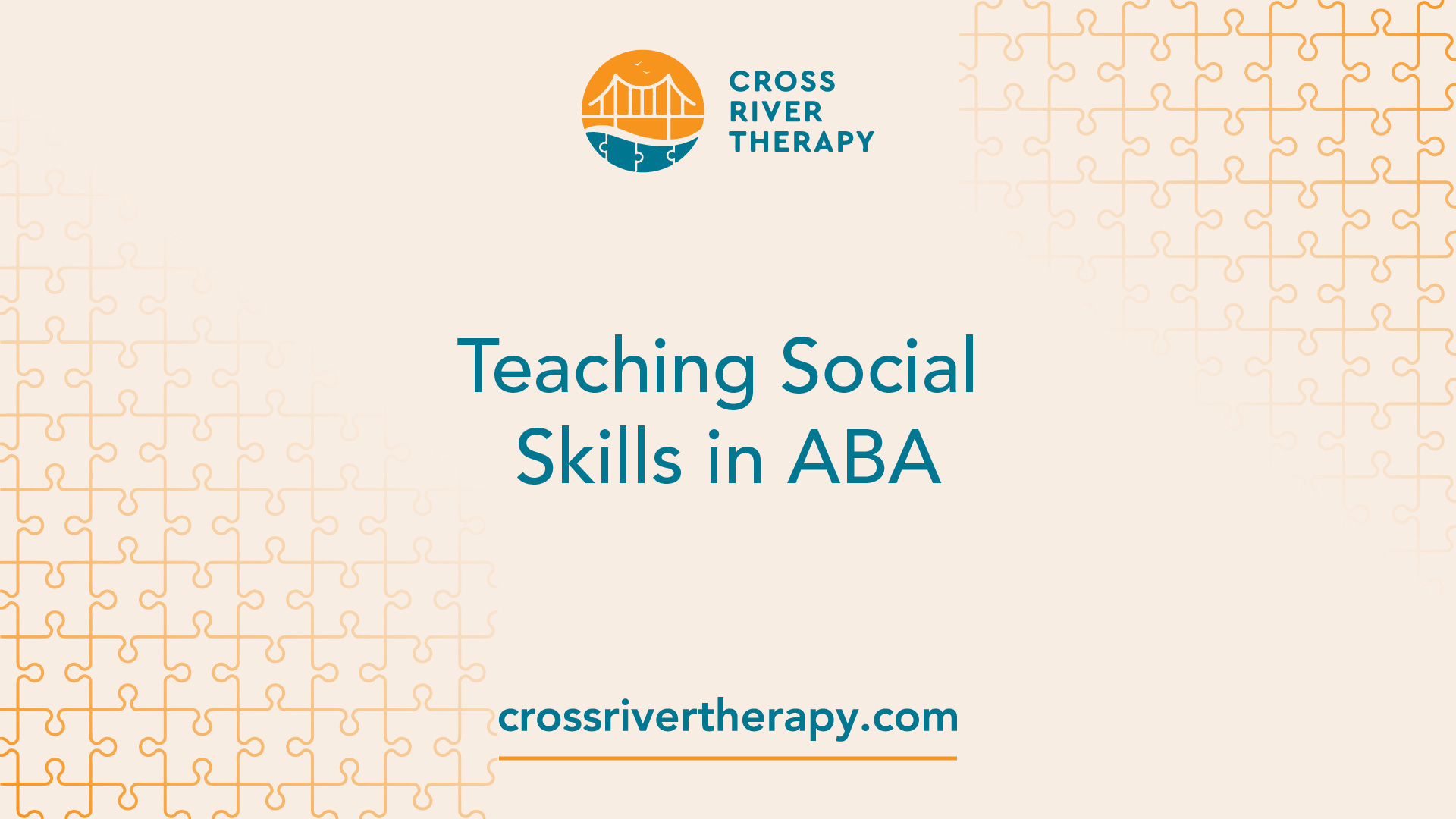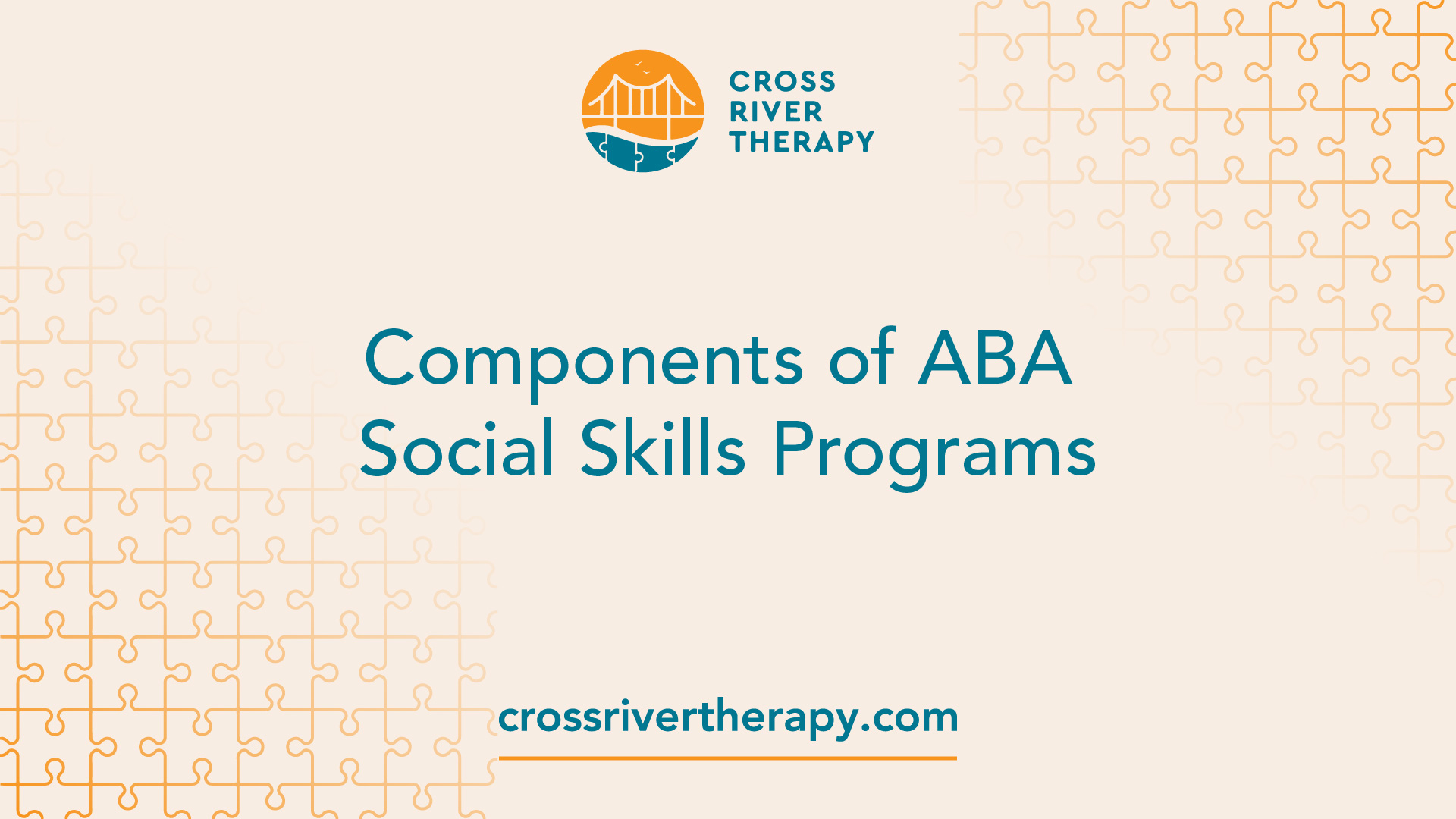Boosting Social Interaction Skills with ABA Therapy
Discover evidence-based techniques for lasting progress.

ABA Therapy for Social Skills
When it comes to helping children with autism develop their social interaction skills, Applied Behavior Analysis (ABA) therapy plays a crucial role. ABA therapy offers tailored programs designed to address the unique needs of each individual learner, providing them with the necessary tools to navigate social situations with confidence and success.
Importance of Social Skills
Social skills are essential for building and maintaining relationships, both personal and professional. They encompass a wide range of abilities such as starting conversations, taking turns, active listening, interpreting social cues, and understanding personal space. Developing strong social skills creates opportunities for meaningful connections, inclusion in classrooms and communities, and overall well-being.
Tailored Social Skills Programs
ABA therapy recognizes the importance of individualization and personalization. Social skills programs within ABA are tailored to the specific goals and needs of each learner. These programs focus on teaching a comprehensive set of social skills, including conversation skills, personal space, hygiene, life skills, and community-based skills. By tailoring the programs to the individual, ABA therapy ensures that the intervention is highly targeted and relevant to the learner's specific social challenges and strengths.
A comprehensive ABA social skills program breaks down complex social skills into smaller, more manageable components. This systematic approach allows for step-by-step instruction, ensuring that learners develop a solid foundation in each skill area. By breaking down these skills, ABA therapy provides individuals with autism the opportunity to learn and practice social skills in a structured and supportive environment, fostering the development of friendships and inclusion.
To assess progress and identify areas of growth, pre-and post-assessments are conducted as part of the ABA social skills programs. These assessments provide valuable information about the learner's baseline abilities and help guide the development of individualized goals and targets.
In summary, ABA therapy offers personalized social skills programs that recognize the unique needs of individuals with autism. By breaking down complex social skills into manageable components, ABA therapy enables learners to develop essential social interaction skills, promoting confidence, meaningful connections, and inclusion in various social contexts.
Teaching Social Skills in ABA

In ABA therapy, teaching social skills plays a crucial role in helping individuals develop meaningful connections and navigate social interactions. ABA therapists utilize various techniques and strategies to effectively teach these skills. Two important components of teaching social skills in ABA are Behavioral Skills Training (BST) and data-driven behavioral objectives.
Behavioral Skills Training (BST)
Behavioral Skills Training (BST) is a structured approach used in ABA therapy to teach social skills. This technique involves a step-by-step process that includes explaining the importance of the skill, modeling the skill, and providing feedback and reinforcement.
During the BST process, the therapist demonstrates the social skill to the individual, explaining its significance and how it should be performed. This is followed by a guided practice session, where the therapist and individual engage in the skill together. Finally, the individual is given the opportunity to practice the skill independently, while receiving feedback and reinforcement from the therapist.
By using BST, individuals with autism can learn and generalize social skills in various settings. The structured nature of BST helps break down complex social behaviors into manageable steps, allowing for effective learning and skill acquisition.
Data-Driven Behavioral Objectives
ABA programs rely on data collection and measurement to assess the effectiveness of teaching social skills. Behavioral objectives with measurable outcomes are developed to determine the progress and success of the intervention. These objectives help establish clear targets and enable data-driven decision-making throughout the therapy process.
Before teaching social skills, a thorough assessment is conducted to identify individualized goals and determine the baseline level of the targeted behavior. Pre-and post-assessments are essential in measuring progress and evaluating the effectiveness of the intervention. The behavior targeted for improvement should be observable and measurable to ensure accurate data collection.
In addition to pre-and post-assessments, ongoing data collection occurs during the teaching process to monitor progress and make necessary adjustments. This data-driven approach helps therapists track the individual's advancement, identify areas for improvement, and modify teaching strategies accordingly.
By utilizing data-driven behavioral objectives, ABA therapists can tailor their interventions to the specific needs of each individual, ensuring that teaching social skills is effective and progress is accurately measured.
Teaching social skills in ABA involves a comprehensive approach that combines techniques like BST with data-driven behavioral objectives. By breaking down social skills into manageable components and utilizing evidence-based strategies, individuals with autism can develop essential social interaction skills that enhance their overall quality of life.
Components of ABA Social Skills Programs

When it comes to teaching social skills in ABA therapy, there are essential components that contribute to effective skill acquisition and progress. Two crucial components are pre-and post-assessments and comprehensive skill breakdown.
Pre-and Post-Assessments
Pre-and post-assessments play a vital role in teaching social skills in ABA therapy. These assessments are conducted to measure a child's baseline social skills and track their progress over time. By evaluating the child's current abilities and identifying areas for improvement, individualized goals can be set to target specific social skills.
The assessments are designed to ensure that behaviors are observable and measurable, allowing for precise evaluation of progress. They help provide a baseline for comparison and guide the development of tailored intervention plans. Pre-and post-assessments are essential tools for both therapists and parents, providing valuable insight into the child's social skills development throughout the ABA therapy process.
Comprehensive Skill Breakdown
In ABA social skills programs, complex social skills are broken down into smaller, more manageable components. This comprehensive skill breakdown allows for systematic teaching in small group settings, fostering the development of friendships and inclusion in classrooms and communities.
By breaking down social skills into smaller steps, individuals with autism can better understand and practice each component. This systematic approach promotes skill acquisition and generalization, enabling individuals to apply the learned social skills in various social contexts. It also helps therapists track progress and identify specific areas that may require further teaching and reinforcement.
A comprehensive social skills assessment is typically conducted to evaluate foundational skills and identify areas that need additional breakdown for effective teaching. This assessment guides therapists in tailoring the intervention to the unique needs of each individual, ensuring that the social skills program aligns with their developmental level and abilities.
By incorporating pre-and post-assessments and comprehensive skill breakdown into ABA social skills programs, therapists can provide targeted and individualized instruction. This approach enhances the effectiveness of ABA therapy in helping individuals with autism develop and improve their social interaction skills, fostering meaningful connections and enhancing their overall quality of life.
To learn more about other ABA therapy techniques and their applications, explore our articles on ABA therapy for self-injurious behaviors, ABA therapy for repetitive behaviors, and ABA therapy and executive functioning.
ABA Techniques for Social Skills
ABA therapy utilizes a variety of techniques to teach and improve social skills in individuals, particularly children, with autism. Two commonly used techniques in ABA therapy for social skills are Discrete Trial Training (DTT) and Task Analysis and Prompting.
Discrete Trial Training (DTT)
Discrete Trial Training (DTT) is an effective technique in ABA therapy for breaking down complex social skills into smaller, more manageable parts. This approach involves breaking a skill or behavior into discrete components and teaching each component individually. By using repetition, prompts, and reinforcement, DTT helps individuals with autism learn and generalize social skills step-by-step.
During a discrete trial, the therapist presents a clear instruction or question and prompts the child to respond. The child's response is then reinforced, typically with positive reinforcement such as praise or a small reward. Through repeated trials, the child learns to associate the correct response with the given instruction, gradually becoming more proficient in the targeted social skill.
Task Analysis and Prompting
Task analysis is another effective technique in ABA therapy for teaching social skills to individuals with autism. This technique involves breaking down complex tasks or behaviors into smaller, sequential steps. By breaking down the skill into manageable parts, individuals with autism can better understand and execute the steps involved [1].
Once the task is broken down, prompting is used to guide the individual through each step. Prompts can be verbal, physical, or visual cues that assist the individual in completing the task correctly. The level of prompting used depends on the individual's current abilities and can be gradually faded as the individual becomes more proficient in the skill.
The goal of task analysis and prompting is to promote independence and facilitate skill acquisition across various social situations. As individuals become more proficient in the steps and require less prompting, they gain confidence and can successfully perform the targeted social skill.
By utilizing techniques such as DTT and task analysis with prompting, ABA therapists can effectively teach and reinforce social skills in individuals with autism. These techniques break down social skills into manageable components, providing individuals with the opportunity to learn and practice skills in a structured and supportive environment. For more on positive reinforcement and functional communication training in ABA therapy, continue reading in the next section.
Positive Reinforcement in ABA
In ABA therapy, positive reinforcement plays a vital role in promoting the development of social interaction skills in children diagnosed with autism. Positive reinforcement involves providing rewards or praise for desired behaviors, motivating individuals to continue performing these behaviors and building their confidence and self-esteem.
Role of Positive Reinforcement
Positive reinforcement is a cornerstone of ABA therapy, utilizing rewards or positive consequences to increase desired behaviors and shape and strengthen adaptive skills in children with autism [1]. By focusing on reinforcing positive behaviors, ABA therapists aim to encourage social interactions and foster meaningful connections with others.
The role of positive reinforcement in ABA therapy is to create a supportive and encouraging environment where individuals with autism feel motivated to engage in social interactions. When positive behaviors are reinforced consistently and appropriately, individuals are more likely to repeat and expand upon these behaviors. This process helps them develop and refine their social skills over time.
Functional Communication Training (FCT)
One specific application of positive reinforcement in ABA therapy is Functional Communication Training (FCT). FCT focuses on improving communication skills in individuals with autism by teaching alternative, functional ways to express needs, reducing frustration, and enhancing effective communication [1].
Through FCT, children learn and practice appropriate communication strategies that are tailored to their individual needs. For example, instead of engaging in challenging behaviors or tantrums to express their desires, they are taught more suitable and effective ways to communicate, such as using gestures, signs, or verbal language. These desired communication behaviors are reinforced through positive rewards, encouraging children to utilize these skills in their daily interactions.
By incorporating positive reinforcement techniques like FCT, ABA therapy helps individuals with autism develop their social interaction skills, fostering improved communication, social engagement, and overall quality of life.
As we explore the different components and techniques of ABA therapy, it becomes evident how positive reinforcement plays a crucial role in promoting social development and enhancing the lives of individuals with autism. The evidence-based nature of ABA therapy, along with its long-term benefits and generalization to various settings, further reinforces its effectiveness in addressing social interaction challenges in children with autism.
Effectiveness of ABA Therapy
When it comes to improving social interaction skills in children with autism, ABA therapy has shown to be highly effective. This evidence-based treatment has been widely recognized and endorsed by reputable organizations such as the American Psychological Association and the American Academy of Child and Adolescent Psychiatry. It has been found to produce measurable positive outcomes, especially in areas like communication and social interaction.
Evidence-Based Treatment
Research has consistently demonstrated the effectiveness of ABA therapy in improving social skills for children with Autism Spectrum Disorder (ASD) [3]. Applied Behavior Analysis utilizes a systematic approach that incorporates principles of reinforcement and behavior modification to teach and reinforce social skills. By breaking down complex social behaviors into smaller, more manageable components, ABA therapists can effectively teach and reinforce the skills necessary for successful social interactions.
Long-Term Benefits and Generalization
Long-term, comprehensive ABA-based interventions have been found to be beneficial for the lifelong development of children with ASD. Studies have shown positive medium to large effects in intellectual functioning, language development, acquisition of daily living skills, and social functioning. These interventions are designed to address social skills in a comprehensive manner, taking into account the individual needs and goals of each child.
ABA therapy focuses not only on teaching specific social skills but also on promoting generalization of these skills across various settings and individuals. By utilizing strategies such as general case programming and naturalistic teaching methods, ABA therapists aim to ensure that the skills learned in therapy are transferred and maintained in real-life situations.
Improvements have been observed across multiple outcome measures in children and youth with autism spectrum disorders (ASD) undergoing ABA therapy. These outcomes include cognitive abilities, language development, social/communication skills, problem behavior reduction, adaptive behavior, emotional well-being, and autism symptom reduction. Although quality of life was not directly measured in the included studies, the positive impacts on various aspects of development suggest an overall improvement in the well-being of children receiving ABA therapy.
In conclusion, ABA therapy has proven to be an effective and evidence-based treatment for improving social interaction skills in children with autism. The structured and individualized approach of ABA therapy allows for targeted skill development and generalization across different environments. By focusing on long-term outcomes and comprehensive skill acquisition, ABA therapy aims to support the lifelong development and social well-being of individuals with autism.
References
[1]: https://www.empowerbh.com/blog/aba-therapy-techniques-for-autism/
[2]: https://abacustherapies.com/aba-therapy-pros-and-cons/
[3]: https://www.empowerbh.com/blog/how-aba-therapy-improves-social-skills/



